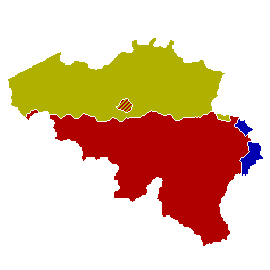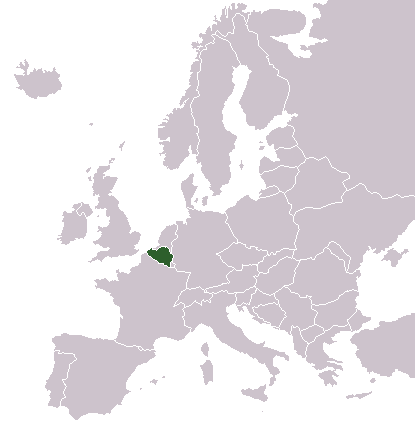Munin
VIP Member
- Dec 5, 2008
- 1,308
- 96
- 83


Belgium is divided, too divided it seems: Since its foundation it has been destined for an internal conflict without ending. The reason is simple: 2 languages (Dutch speaking North and a French speaking South) and 1 language group dominated the other for quite some time. The elitist French-speaking Walloons were the ones to rule the country since its existence, french language and culture were thought to be superior to the dutch/flemish culture. For a long time the dutch language and flemisch culture were oppressed by a french elite. This created the flemish-nationalist movement that fought for the rights of the flemish people and also included a number of radicals that seeked revenge for the unjustice done to them.
This cultural oppression led to several conflicts that have continued throughout Belgian history: During WWI Flemish activists were welcoming the germans as liberators and were being treated better. During the German occupation in WWII the Flemish people collaborated with the nazi-germans against the French-speaking elite in order to gain respect for the Flemisch culture, language and possibly to be able to rule the country itself. Flemish soldiers joined and fought to their deaths on the front lines against the Soviets, most of them would never come home and those who did would be persecuted in their homeland when the war ended (for them the war would never end). This of course is a dark page in the Flemisch-Nationalist history and is a part that would stigmatize the flemish movement for the years to come and can be traced back to the flemish political parties of today.
Dark page of Flemish history http://en.wikipedia.org/wiki/27th_SS_Volunteer_Division_Langemarck

After WWII things changed and the economical powerbalance between Flanders and Wallonia changed dramatically, Flanders grew richer and richer and took the capitalist highway with export and innovation and thrived because of foreign investments. Wallonia tried to stick with the old ways and tried to preserve its old steel industry, pooring money into a state owned company that would eventually go bankrupt ... it was a disaster. Flanders is rich and Wallonia is left with a pile of debt and many people unemployed, this also increased the money transfers to Wallonia (see the explanation below). And with economical power comes political power: this is used to create a separate government below the belgian government with its own parliament, ... but it is only possible to change this through constitutional changes (this needs a 2/3 majority, which means that changes are only possible if the french speaking politicians agree with the changes).
A singularly important issue for the 21st Century Flemish Movement are the financial transfers; the Net amount of money that flows from Flanders to Wallonia and Brussels. Flanders has supposedly transferred 6 billion euros every year (12 billion if you add the interest on Walloon part of the National debt, which is supposedly about 60% of the total debt).[2][3][4] During the 19th century there were transfers from Flanders to Wallonia, even though Wallonia was the richer of the two regions.[5] The reason was that there was no social security system and the tax legislation was never adjusted to reflect the industrial affluence of Wallonia.
Then there are also the ideological disagreements: Flanders is ideologically right (democrats, liberals) and Wallonia is left (they re socialist). Ironically this makes that the people who are solidary on a belgian level are not the ones that need to be solidary when socialist belgian mesures are implemented: The Flemish will pay for it, because they are more whealty. This is also because of the "democratic elecoral system": favors the minority (because of the constitution that protects a minority from being dominated by a majority), elections are held seperatly in the Flemish part and the French part of the country and elected officials are then able to make a belgian goverment.
Only a drop of displeasure is needed to make the conflict explode into a big existence crisis for Belgium and that drop came when french politicians tried to annex a part of Flanders. This was achieved by having a growing french speaking population in Flanders that refuses to speak dutch, these people are able to vote for french political parties and these french political parties have now become so big that they can take over several small Flemish cities around the mostly French speaking billangual capital.
Now Belgium has come to a point where 30% of the flemish people has elected a Flamish Nationalist party that favors Flemish independance, combined with the result of other Flemish Nationalist parties we get almost 50% of the flemish votes. A government can not be made without them because they are now the winners of the Flemish election, the result is that big changes will have to be made: No more annexation of flemish cities, less Belgian government and now money responsibility (no more transfers: each region will have to pay for their own expenses, they will no longer be able to ask money from the belgian taxpayers through the belgian government), ... The issue now is that the French keep saying no to new changes to the Belgian government system, as a result Belgium may no longer exist in the future
Also: Did I mention the Belgian king is not able to speak proper dutch? And that a lot of the French politician are not able to speak dutch at all (while the majority of the flemish politician are able to speak french)?
Last edited:
